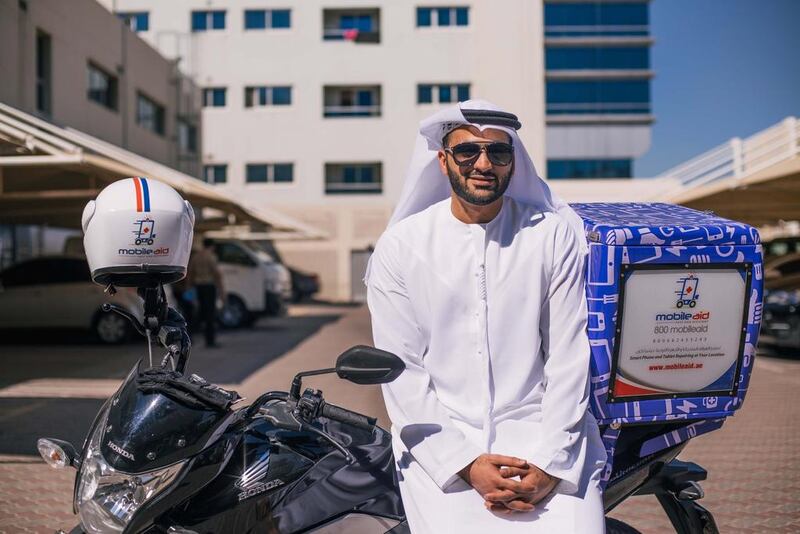It was a classic light bulb moment for a couple of budding tech-savvy entrepreneurs.
“We realised that it had reached a point where everyone in the UAE owned just about everything from a consumer electronics point of view,” says Khalid Sharaf, who started Mobile Aid with his first cousin Essa Sharaf at the end of 2014 to serve what they both saw as a glaring need.
“It was more and more clear to us that there was a gap in the service industry, so we decided to follow what we love – technology – and provide a service that was not there,” says Khalid.
Mobile Aid’s concept is simple enough: wherever you are in Dubai, the company will dispatch a repair man via motorbike to fix your device – in a similar manner to a phone doctor who makes house calls.
“Mobile Aid was established to service customers at their location. Maybe you’re at the park with the kids, a coffee business meeting, and whether it is a smartphone, tablet, whatever – the device is bent, you have a cracked screen, a speaker problem – we come in quietly and repair the device and leave,” says Khalid.
__________
Free advertisement
■ For SMEs who want to place an ad free of charge visit: https://www.thenationalnews.com/small-business-ads
__________
As with a doctor’s house call, the technician who turns up in the snazzy Mobile Aid outfit and helmet has the know-how to fix a wide array of problems. Sometimes the damage is so severe it needs to be taken in for a more serious workover, but the objective is to patch it up on the spot.
The company took its first order last spring and so far the ride has been bumpy, although the founders have had plenty of back-up.
Khalid and Essa, who had both gone to Mawakeb private school and lived on the same street (“growing up as brothers”, Khalid says), ended up with similar academic and business interests.
Khalid had pursued the multi-discipline mechatronics degree at the Higher Colleges of Technology and then mechanical engineering in Boston before joining as a project engineer trainee at Emirates Aluminium in 2011.
Essa took the armed services route, which included homeland security training in Virginia, including the study of mobile technology.
And, as is often the case for Emirati start-up businesses, the entrepreneurs have found there is considerable support available. Although family connections also helped.
Once they decided that consumer technology was their business of choice, the Sharaf cousins secured the backing of Sharaf HQ Investments, an investment unit of the Sharaf Group, one of Dubai’s biggest family-owned conglomerates. The chairman is Yasser Sharafuddin Sharaf, Essa’s brother and Khalid’s cousin.
The start-up also qualified for support from Dubai SME, the Department of Economic Development's unit which was set up in 2002 to give the full range of support – including finance – to Emirati-owned start-ups.
But while the company had its financial backer and start-up financing, the two founders realised it was not enough.
“Coming up to April we realised we needed more marketing; we did the plan and found it was going to be a bit expensive and went back to Dubai SME and said we needed about Dh300,000,” says Khalid. “They were more than happy to give us the financing over five years at zero interest with pretty comfy payments.”
That is precisely what the government unit is there to do, he says, to support the right kind of indigenous companies with the right kind of image.
“This is what people are hungry for today. There are not enough Emirati companies that are innovative or attractive,” adds Khalid. “Once people know there is a young Emirati company providing a quality service, they want to support it because it is Emirati.”
This brings the entrepreneur to one of the key challenges Mobile Aid has faced it its first year – hiring and training staff to project the desired image.
It became a tall order to find someone with the combination the company required: qualified to repair electronics, willing to ride a motorbike and possessing the ability to deal with the public discreetly, efficiently and honestly.
This was particularly the case early on when the customer base was almost exclusively Emirati and female, says Khalid.
“It has been my biggest challenge,” he says. “Now, we are coming up with a plan with Sharaf HQ HR department, looking to develop the staff. We knew we had to offer higher wages to start. But the work environment is also important, and developing employees and the skills they have. As an employee myself, I expect my employer to develop me. I want my receptionist, everybody, telling me ways to improve the process.”
Securing the right staff will be crucial for the company’s growth plans; it will expand into Abu Dhabi first and then to other locations – through franchising – in the Arabian Gulf region.
Khalid, like many local entrepreneurs, continues to work for the Government in a job he reckons dovetails with his start-up experience: he is a youth development adviser for the Expo 2020 project.
“It is something we are looking into at Expo 2020 – teaching youth to embrace failure as a concept for innovation. Failure is part of success and we need in the UAE to innovate more and to create our own technology companies to compete with the West. If we put the seeds into the ground now we will see the fruit in a few years.”
amcauley@thenational.ae
We are on the lookout for SME success stories. If you want to have your business profiled, contact us at business@thenational.ae
Follow The National's Business section on Twitter





